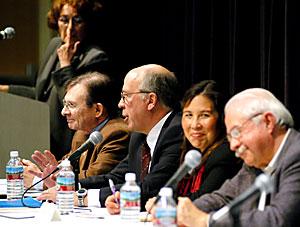 |
|
Evan Caravelli/Arizona Daily Wildcat
|
President Peter Likins (second from left), Provost George Davis, MROC Co-Chair Naomi Miller and a committee member of Eleven Chair, laugh as Davis answers a question yesterday at a town hall meeting in the Gallagher Theater at the Student Union Memorial Center.
|
|
|
By Jeff Sklar
Arizona Daily Wildcat
Wednesday, February 4, 2004
Print this
Several administrators and faculty members agreed at a town hall yesterday that the UA community must create a campus more accepting to women and minorities.
Comparing a white male-dominated university to inbreeding, they said a diverse campus fosters an educational environment that exposes students to a broader range of ideas.
That's especially critical as women and minorities become increasingly powerful throughout society, and a new generation is forced to work with people who don't look like they do, said President Peter Likins.
Likins spoke in unusually impassioned tones at the town hall to a group of about 50 students, faculty and staff, calling diversity a fundamental aspect of American society.
"We need to embed this in the core of our dialogue about ourselves," he said.
More than two years after a campus-wide study found that women and minority faculty members face challenges and even hostility at the UA, the university hosted the forum to evaluate progress toward making the campus more hospitable.
Several panelists voiced optimism that the UA is heading toward that goal, but Likins also pointed out that many of the audience members were people who he knew already valued diversity.
He said he would have considered the forum more successful if he had seen different faces.
Likins challenged those present to make others aware of the panel's message: The world is becoming more diverse, and university community members need to adapt to the changing reality.
"We simply must, for survival, figure out how to adapt to people different from ourselves," he said.
People who don't make that attempt are contributing to "intellectual
inbreeding," in which faculty members simply hire more white males rather than actively seek out women and minorities, said Allison Vaillancourt, assistant vice president for human resources.
She called for attendees at the forum to share this message with diversity "non-believers" around the campus, saying that improving diversity is a fundamental requirement for creating a better academic climate.
"In order for us to be truly successful, we all have to buy into this notion that diversity is important to this community," she said. "In many ways, we are marrying our cousins here."
Physics professor J.D. Garcia said the university might benefit from "cluster hires" where several faculty from a variety of academic disciplines and underrepresented backgrounds are hired at once.
The College of Science recently completed a cluster hire of two women, one Hispanic male and one white male, who work in several disciplines, he said.
"That's better odds than you can find anywhere else on this campus in terms of percentages," he said.
Faculty members also need to consider diversity as they go about their academic duties, said Richard Ruiz, professor of language, reading and culture.
That means more than considering broad perspectives when assigning reading and giving lectures.
It means embedding diversity in core beliefs and acting out those beliefs, he said.
"With respect to diversity, do we really believe that diversity is an important thing?" he asked. "My sense is that most of us do, but some of us do not."
Likins emphasized the compatibility between diversity and Focused Excellence, his plan to narrow the university's mission. He said the university's geographic placement in the Southwest means it should strive for excellence in areas that study the people of the region.
He pointed to the American Indian Studies Program as "world-class" and said he was confident the Mexican American Studies program could reach the same level.
Other panelists were Provost George Davis and Naomi Miller, an associate professor of English who co-chairs the Millennium Report Oversight Committee, which works to improve the campus climate for underrepresented faculty.
They agreed with the other panelists that creating a culture accepting of diversity requires a campus wide buy-in.
The UA will host a similar town hall about diversity at noon on Feb. 11 in the DuVal Auditorium at the Arizona Health Sciences Campus.
